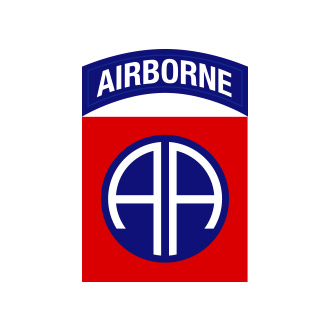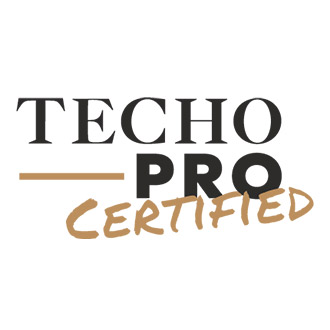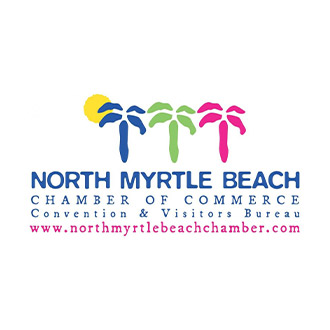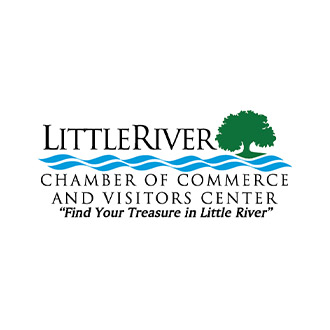Why Should I Use Paver Sealing in Myrtle Beach
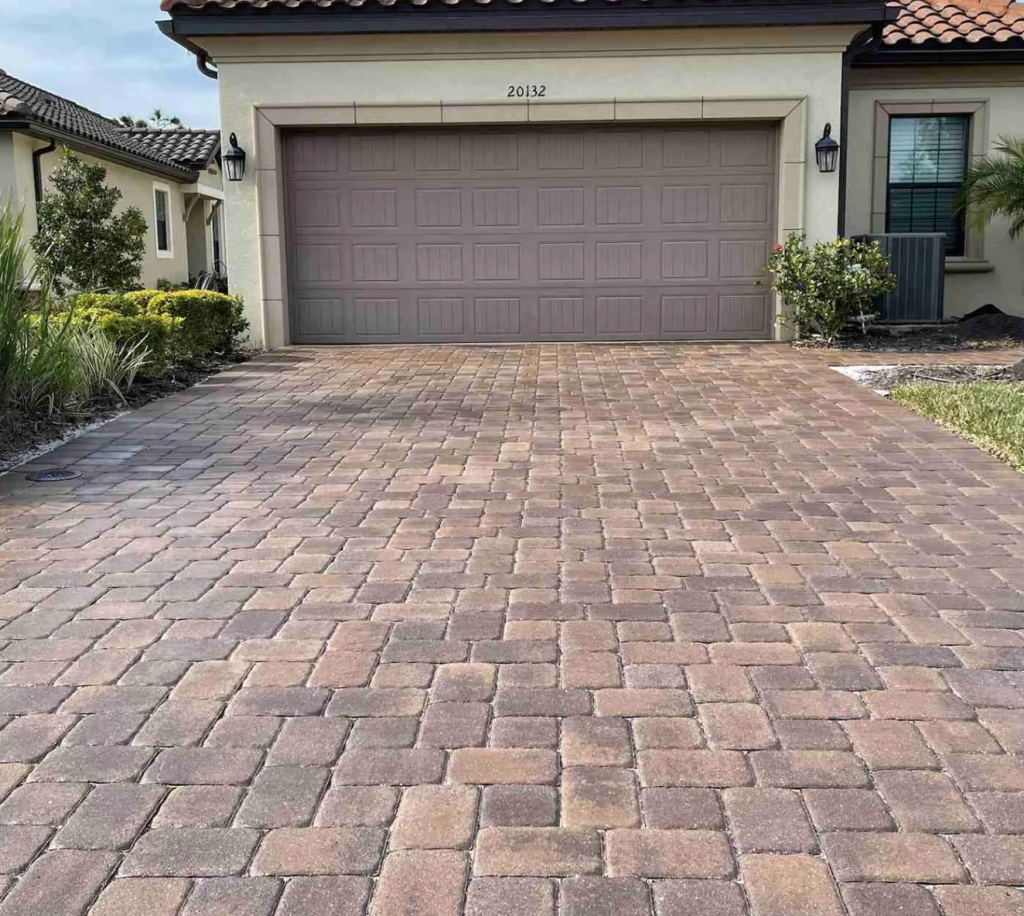
Image credit: paversealerstore.com
You should use paver sealing on your pavers because it protects your beautiful paver patios, driveways, and walkways, which are an investment in your outdoor living area.
This guide provides direct, clear answers to common questions about paver sealing, specifically for homeowners, helping them make informed decisions about their property.
What are the Benefits of Paver Sealing for Homes in Coastal Areas
- UV Protection and Color Preservation: Coastal regions like Myrtle Beach typically experience intense sun exposure. Due to harsh UV rays, unsealed pavers can quickly fade and lose their vibrant color. Paver sealants act as a protective barrier, preventing sun damage and preserving the original aesthetic of your pavers. Some sealers enhance their color, giving them a “wet look” or a richer tone.
Fight Off Mold
- Defense Against Mold, Mildew, and Algae: High humidity and frequent rainfall are hallmarks of coastal climates, creating ideal conditions for unsightly mold, mildew, and algae growth on porous paver surfaces. Sealing creates a non-porous barrier that inhibits the growth of these organisms, keeping your pavers cleaner and safer (as these growths can be slippery).
- Stain Resistance and Easier Cleaning: Coastal environments often contain sand, salt spray, and organic debris. Unsealed pavers readily absorb spills from outdoor living (like BBQ grease, drinks) and natural elements, leading to stubborn stains. A sealed surface repels liquids and contaminants, making spills easy to wipe away and significantly simplifying routine cleaning and maintenance.
- Joint Sand Stabilization and Weed/Ant Deterrence: Heavy rains and foot traffic in coastal areas can wash away the joint sand between pavers, leading to shifting, instability, and a breeding ground for weeds and ants. Additionally, lock the sand in place, maintaining the structural integrity of your hardscape and deterring unwanted growth.
Saltwater Protection
- Protection Against Saltwater and Erosion: Professional paver sealing is critical for properties directly exposed to salt air or saltwater. Salt can be corrosive to paver materials, accelerating deterioration and efflorescence (white mineral deposits). Sealants provide a barrier that helps resist salt penetration and water infiltration, preventing erosion and preserving the pavers’ longevity.
- Increased Durability and Lifespan: Paver sealing significantly extends the lifespan of your pavers by protecting against UV damage, moisture absorption, and general wear and tear from coastal weather. This preserves your initial investment and reduces the need for costly repairs or premature replacement.
- Enhanced Curb Appeal and Property Value: Well-maintained and vibrant pavers significantly boost the curb appeal of your coastal home. A clean, protected, visually appealing outdoor space leaves a lasting impression and can increase your property’s overall market value. Read more about Why Pavers Increase Your Property Value.
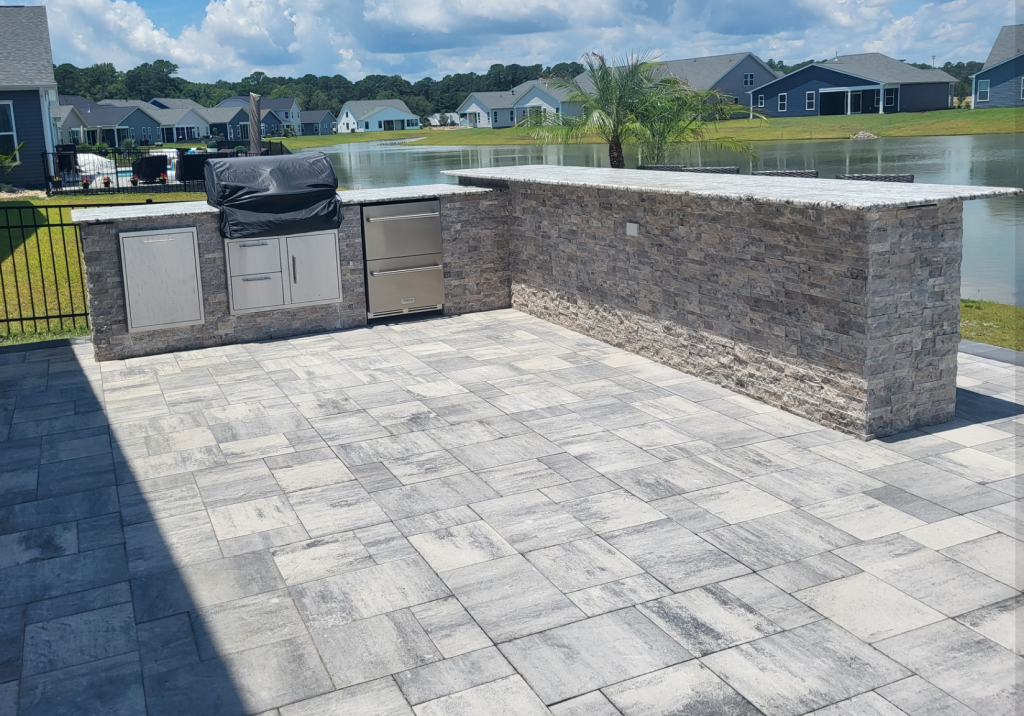
Image credit: Elite Coastal Landscaping
What are the Different Types of Paver Sealers Available in Myrtle Beach
- Water-Based Sealers: These are generally eco-friendly, low-odor, and offer a natural look or a subtle enhancement. Furthermore, they are easier to apply and clean up, making them a popular choice for homeowners.
- Solvent-Based Sealers: Often provide a more significant “wet look” or color enhancement and can offer greater durability. However, they have a more pungent odor during application and require specialized cleanup. Note for Myrtle Beach: Some solvent-based sealers can trap moisture in our humid climate, leading to hazing or peeling. Discuss this with our professionals.
- Penetrating Sealers (Silane-Siloxane): These sealers penetrate the paver material, offering excellent water repellency without changing the surface appearance. They are ideal for maintaining a natural look and resisting efflorescence (white mineral deposits).
- Acrylic Sealers: Form a protective film on the surface, offering good color enhancement and stain resistance. They are commonly used for a “wet look” finish.

How Much Does it Cost to Seal Pavers?
The cost of paver sealing varies depending on several factors. In Myrtle Beach, you can generally expect costs to range, with key determinants being:
- Area Size: Larger areas typically have a lower per-square-foot cost.
- Paver Condition: Heavily stained pavers or those with significant weed growth will require more intensive cleaning and preparation, increasing labor costs.
- Type of Sealer: Premium, long-lasting, or specialized sealers will cost more per gallon.
- Desired Finish: A high-gloss finish might require specific products or multiple coats, impacting the price.
- Accessibility: Areas that are difficult to access with equipment can increase labor time.
- Repairs Needed: If the pavers are cracked, uneven, or have drainage issues, these repairs will increase the total cost.
Should I DIY Paver Sealing or Hire a Professional?
While DIY kits are available, professional paver sealing offers significant advantages, especially in the Myrtle Beach climate:
Expertise and Experience: Professionals understand the unique challenges of coastal weather and select the appropriate sealers and application techniques for optimal results and longevity.
Proper Preparation: Thorough cleaning, weed removal, and re-sanding are crucial for a successful seal. Professionals have the equipment and knowledge to prevent issues like trapped moisture or uneven finishes.
Time Savings: Sealing pavers is a multi-step process that can be time-consuming. Hiring a professional frees up your weekend to enjoy your outdoor living space.
Warranty: Reputable paver sealing companies in Myrtle Beach often offer warranties on their work, providing peace of mind.
How Often Should Pavers be Sealed?
Generally, pavers in hot coastal areas like Myrtle Beach should be re-sealed every 2-3 years. However, this can vary based on:
- Sun Exposure: Areas with constant direct sun might need more frequent sealing.
- Traffic: High-traffic areas like driveways will wear down the sealant faster than a rarely used patio.
- Type of Sealer Used: Some sealers are designed for longer lifespans.
- Environmental Factors: Proximity to the ocean, heavy rain patterns, and surrounding foliage (which can contribute to organic growth) can influence the need for re-sealing.
What is the Process for Professional Paver Sealing?
When you hire a professional for paver sealing, you can expect a comprehensive process that typically includes:
- Assessment: A thorough evaluation of your pavers’ condition, identifying any existing stains, damage, or areas needing repair.
- Deep Cleaning: Using specialized pressure washing equipment removes dirt, grime, mold, mildew, and efflorescence. This is a critical step to ensure proper sealer adhesion.
- Weed Removal and Joint Preparation: Eliminating weeds and thoroughly cleaning the paver joints.
- Re-sanding: Applying fresh, clean sand (often polymeric sand, which hardens) to the paver joints to stabilize them and prevent future weed growth.
- Sealer Application: Applying the chosen sealer evenly and professionally, often in multiple coats, allowing for proper drying time between applications.
- Final Inspection: A quality check to ensure a flawless finish and address concerns.
Can Paver Sealing Fix Existing Stains on My Patio?
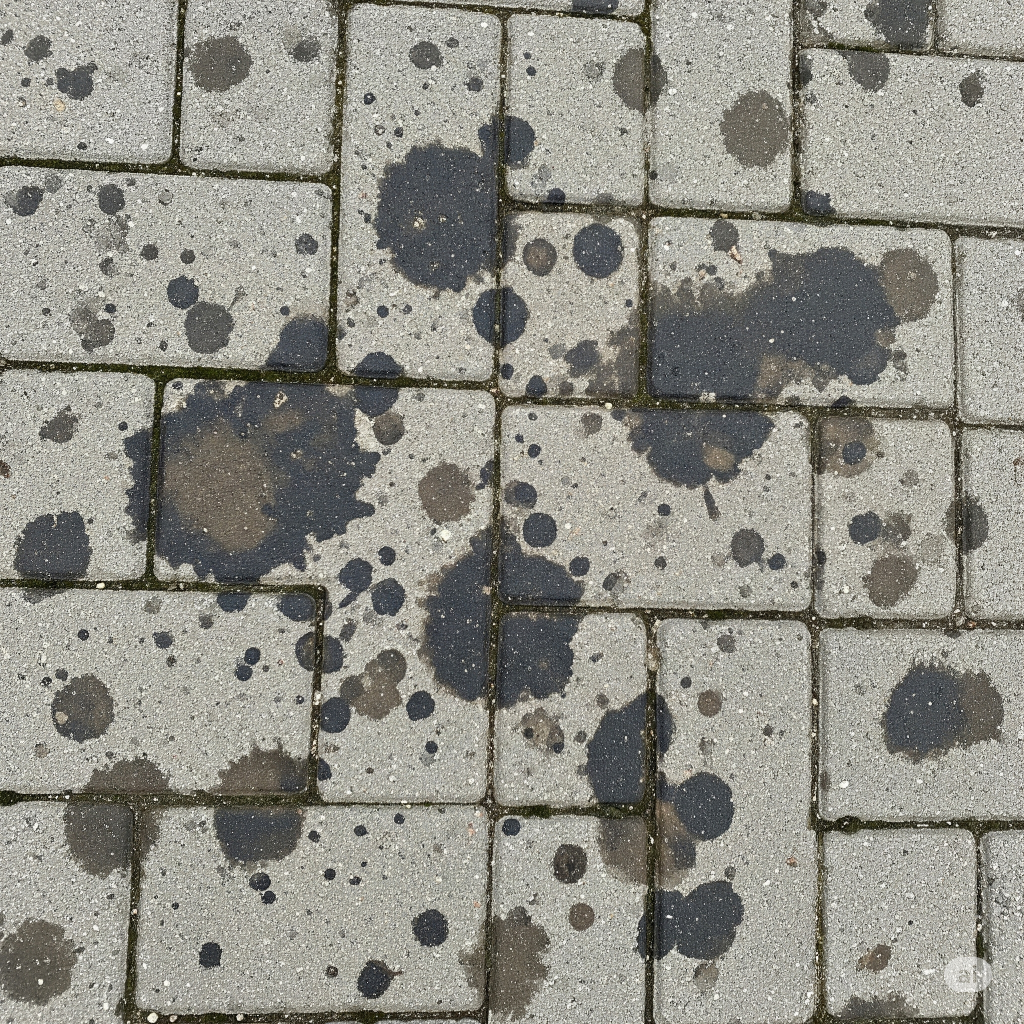
Existing Stains: While sealing creates a protective barrier, addressing existing stains before sealing is crucial. Professional cleaning can remove many stains (oil, rust, irrigation) and ensure the sealer adheres properly, preventing them from being trapped underneath.
Efflorescence: This white, powdery substance is a common issue, especially in humid climates. It’s caused by mineral salts rising to the surface of the pavers. Professional cleaning can remove efflorescence, and certain penetrating sealers can help prevent its recurrence by reducing moisture absorption.
Weed & Ant Problems: Sealing doesn’t completely stop weeds or ants, stabilizing the joint sand with a polymeric sand and sealer significantly deters their growth and makes it much harder for ants to build nests in the joints.
What Happens if I don’t Seal My Pavers?
The Consequences of Neglecting Paver Sealing. Ignoring paver sealing in Myrtle Beach can lead to:
- Accelerated Deterioration: Your pavers will break down faster due to weathering, UV exposure, and erosion.
- Permanent Stains: Spills and organic growth will become deeply ingrained, making them impossible to remove without costly professional restoration or paver replacement.
- Structural Instability: Loss of joint sand can lead to shifting pavers, tripping hazards, and the need for expensive repairs.
- Diminished Aesthetics: Faded colors, widespread mold, and uneven surfaces will detract from your home’s appearance and value.
- Increased Maintenance Burden: You’ll spend more time and effort cleaning and maintaining unsealed pavers, often with unsatisfactory results.
How Long Does Paver Sealer Last in Coastal Climates?
Longevity of Sealing on Pavers in Coastal Climates
As mentioned, a good professional paver seal in coastal climates typically lasts 2-3 years. However, factors like direct sun exposure, heavy foot or vehicle traffic, and the specific type of sealer used can influence this. Regular inspections can help determine when it’s time for a reapplication.
Eco-Friendly Sealing Options
Many reputable paver companies in Myrtle Beach offer water-based and other environmentally friendly paver sealing options. These sealers minimize VOCs (volatile organic compounds) and are an excellent choice for homeowners concerned about their environmental footprint. Always ask your chosen professional about their eco-friendly product offerings.
What is Efflorescence on Pavers?
Efflorescence on pavers is a common phenomenon that appears as a white, powdery, or hazy residue on the surface of concrete, brick, stone, and other porous building materials. It’s often mistaken for fading or a defect, but it’s natural.
Here’s a breakdown of what causes it and why it happens:
What Causes Efflorescence?
Efflorescence is the migration of water-soluble salts from within the paver or its surrounding materials to the surface, where they crystallize as the water evaporates. Three main conditions must be present for efflorescence to occur:
Presence of Soluble Salts: These salts (often calcium hydroxide, calcium carbonate, or other mineral salts) are naturally present in the cement used to make pavers, in the bedding sand, aggregate, base materials, or even in the soil beneath the pavers.
Moisture: Water is the vehicle that dissolves and carries these salts to the surface. This moisture can come from various sources:
- Rainfall
- Groundwater (rising from below)
- Sprinkler systems
- High humidity or dew is often found in coastal climates
- Improper drainage allows water to pool.
- Excessive moisture during the paver manufacturing process (primary efflorescence)
Evaporation: As the water carrying the dissolved salts reaches the surface, it evaporates into the air, leaving the solid salt crystals behind as the visible white residue.
What Does Efflorescence Look Like?
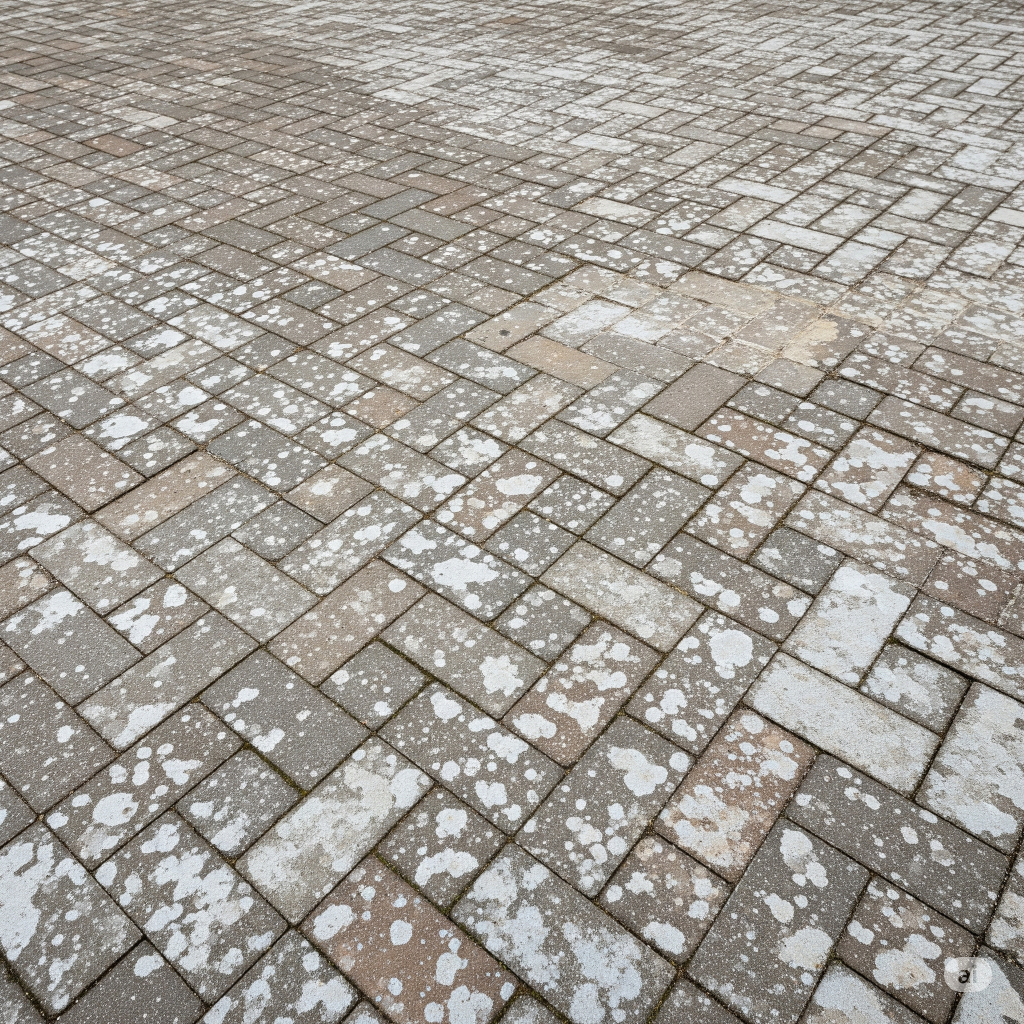
- It typically looks like a white or grayish chalky film.
- It can range from a light haze to a thick, scummy layer.
- It often temporarily disappears when the pavers are wet (because the salts re-dissolve into the water) and reappears as they dry.
- It’s generally more noticeable on darker-colored pavers.
- It can affect entire areas, individual pavers, or just sections.
Is Efflorescence a Problem?
While efflorescence is primarily an aesthetic issue and generally doesn’t harm the structural integrity of the pavers, it can significantly detract from their appearance. If left unaddressed, it can also become more difficult to remove over time.
Ready to Protect Your Paver Investment?
If you live in the Myrtle Beach or surrounding coastal areas, Elite Coastal Landscaping is a professional paver sealing company near you. You are in good hands with over three decades of experience installing and working with pavers. Invest in this safeguard for the beauty, durability, and value of your Myrtle Beach home’s outdoor spaces. Don’t let the coastal elements undermine your outdoor oasis.

